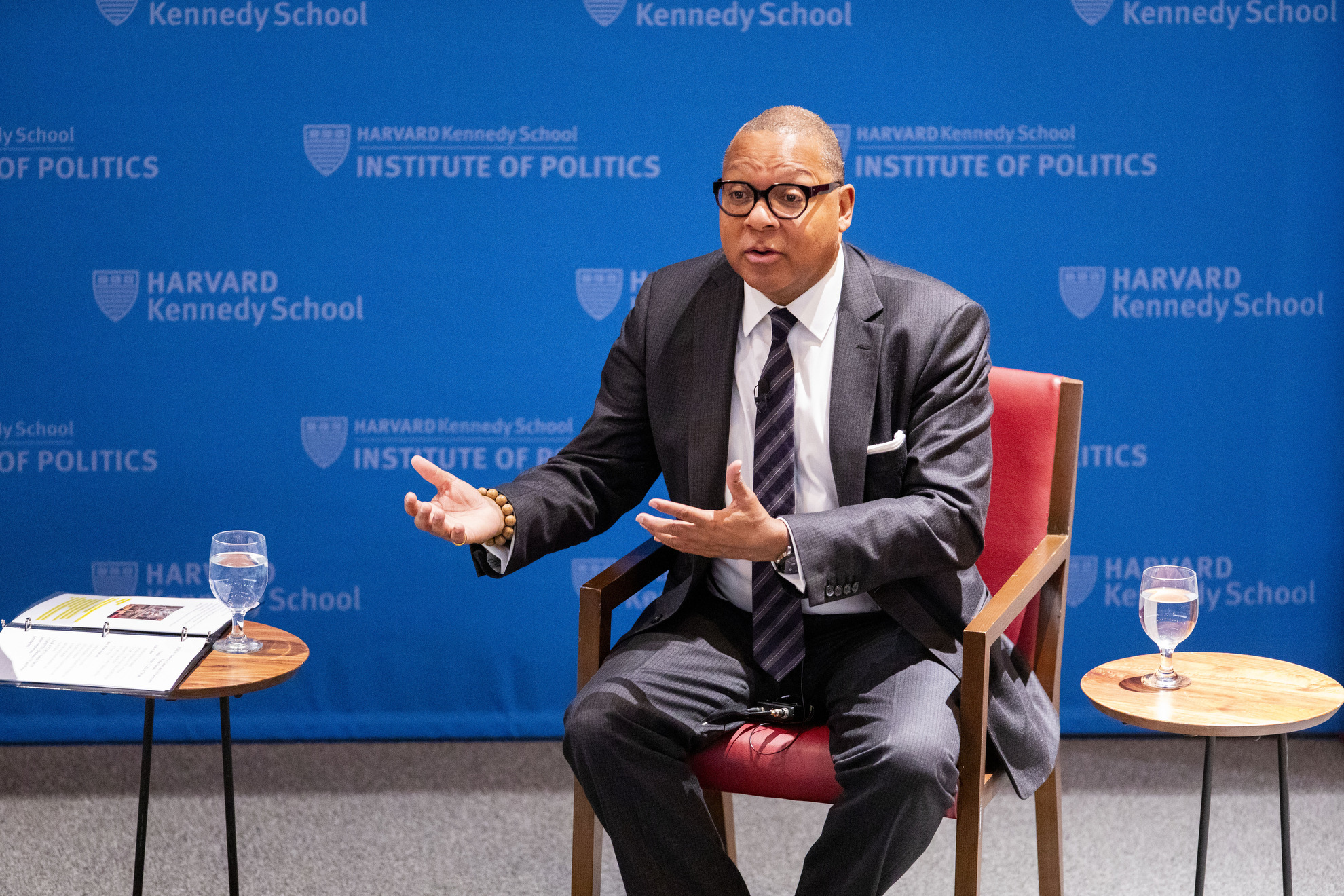What jazz teaches about necessity of civil discourse
Musician, composer Wynton Marsalis visits campus to help launch Culture and Civil Society Initiative

Wynton Marsalis.
Veasey Conway/Harvard Staff Photographer
Jazz offers an important lesson on the vital importance of civil discourse, according to jazz great Wynton Marsalis.
“If I’m playing in a rhythm and you’re playing a totally different rhythm, we’re not going to agree,” said the acclaimed composer and musician last week at a campus event. “Not only are we not going to agree, we’re not going to sound good. And if we don’t have the same understanding of what we’re trying to do on the bandstand, we’re going to have hard time.”
And, he said, when musicians agree less and less on what constitutes their common musical history, they lose the language that connects them.
A longstanding advocate for arts education and for wider recognition of jazz and its contributions to American culture and history, Marsalis spoke on Feb. 10 with Anthony Foxx, co-director of the Center for Public Leadership and the Emma Bloomberg Professor of the Practice of Public Leadership at Harvard Kennedy School, to launch the Culture and Civil Society Initiative.
A similar foundational agreement to the one that makes jazz possible undergirds this country, said Marsalis, who is managing and artistic director of Jazz at Lincoln Center. “If we cannot agree that the Constitution is a document that is designed to create agency for others and that it is a leveling document, we can’t have a democracy.”
There are some in the nation focused on “dismantling democracy with chaos and creating a working class that is disenfranchised — [they hope] all over the world,” so that everything “can be turned over to corporations who have done nothing to show you that they are trustworthy,” he said.
Marsalis, 63, broke out in the early 1980s as a trumpet-playing prodigy, winning Grammys in both jazz and classical music in 1983 and 1984, a historic first. In 2009, Harvard presented him with an honorary Doctor of Music. From 2011-2012, he gave a series of performances and lectures on music at Sanders Theatre.
Marsalis was on campus last week to help launch the new research and teaching program at CPL. The initiative seeks to harness the power of arts and culture to fortify democratic institutions and encourage civil dialogue. Foxx said the idea for the program evolved from his conversations with Marsalis.
Marsalis said he was not alarmed that today’s partisanship might irreparably divide Americans because he sees this as a clash over power and economics that’s been going on in the U.S. for centuries.
“I’m always optimistic because I understand what our history has been. We’re still fighting the Civil War; and now, the South is ahead,” he said.
As a young horn player, he recalled receiving valuable lessons from seasoned pros like his father, the late pianist Ellis Marsalis. He tries to offer similar guidance to students at his alma mater, Juilliard, where he is now director of jazz studies.
“I always say, take yourself seriously; take what you think seriously; take what you feel seriously; take your power seriously; take your word seriously. These are always serious times, and not because of any new president,” but because fighting for human rights and for everyone to have an equitable life is an “uphill battle” that never ends.
Marsalis could have become a classical music star (he has recorded 20 classical albums) but said he had little doubt about his career path, having grown up in a family of jazz musicians. For those students who aren’t sure which creative path to follow, however, he encourages them to write a mission statement.
“It’s three sentences: What I want to do, through what means am I going to do it, and why do I want to do it? And I tell them, work on this like it’s a poem to yourself and take words out of it. And just study it,” he said. As musicians, “we’re always studying other people — Charlie Parker or [Thelonius] Monk. It’s important to study other people, but study yourself and get to what you really want to do.”
Marsalis batted away the suggestion that jazz carries some extra historical or cultural burden because it, like the blues, is born from blood and pain.
“Everything is born in some kind of pain. It is a fact of life. It doesn’t make you able to do anything. A lot of people are in pain. It doesn’t mean they sing like Billie Holiday.” The central question in jazz, Marsalis said, is “can you play? If you can play, play it.”




